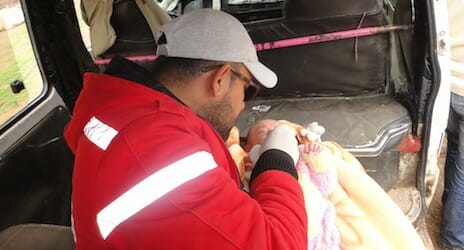By Viviene Tou’meh, Syrian Arab Red Crescent
There were humanitarian issues in al-Hasakah governorate even before the conflict broke out in Syria. After three years of fighting, the situation is dire. Drought, severe winter conditions and low temperatures only make matters worse
One resident said that resources were hard to come by. “Last year, we cut the trees in order to warm ourselves and all the roads from al-Raqqah. Deir Ezzor and Aleppo were cut off causing a rise in food prices and a lack of fuel.”
Despite these obstacles, the Syrian Arab Red Crescent (SARC) has been able launch a polio vaccine campaign in the governorate, reaching thousands of vulnerable children with this important programme. Working in partnership with UNICEF, the World Health Organization and the Ministry of Health, SARC took the lead in conducting the operation inside the most challenging areas of the country.
Earlier this year 30 volunteers from al-Hasakeh, in cooperation with the Ministry of Health, were trained in vaccination techniques especially the importance of keeping the vaccine supplies safe and out of sunlight while working in the field. “One of the main obstacles this campaign faces in al-Hasakah was the electricity cuts which affects the vaccine storage,” one volunteer said.
A team of 20 went into Tal-Brak neighbourhood as part of the campaign and vaccinated 1,591 children. In total SARC has immunized 13,249 children in Tal-Brak, Ras al-Ayn, al-Houl and Im Madfaa’ in al-Hasakeh during the third phase of the polio campaign.
“In the beginning people felt afraid and they started to ask us who we are?”, says Muhammed Ayoub, one of volunteers involved in the polio vaccination. “I have taken the vaccine myself in front of the families in order to show them it is safe.”
Changing fortunes
The changes in Syria’s situation has meant a major change in SARC’s operation as the focus moves from external refugees to those fleeing from violence within the country. The al-Hasakeh branch is used to working with refugees. After the 2003 war in Iraq, al-Hasakeh welcomed Iraqi refugees in high numbers providing food parcels, medical help and psychosocial support. In 2011, a large number of people from Deir Ezzor arrived, putting a huge burden on local resources and the SARC branch. More recently, more displaced people have arrived from Deir Ezzor, Homs, Idleb, and Aleppo. Last year the events also forced people to flee their homes inside the governorate in Ras al-Ayn and al-Sheddadi areas.
The ability of SARC volunteers to reach communities that may have been cut off by the conflict as part of the vaccination programme has given them the opportunity to provide additional assistance, especially in water and sanitation services.
One of the residents of al-Dersheh village told volunteers about nine children on the other side of the village who were cut off by flooding. Mohammed says: “We decided to pass the flood on our feet and reach those children on the other side of the village.”
In future, volunteers are confident that they can reach many more children. “People have started to come back to their homes here, and now those we met know the importance of getting their children vaccination until the age of five,” Mohammed says.
The most recent phase of the campaign started on 6 April, and will immunize thousands more children against a disease that can cause paralysis or even death.




Discussion about this post